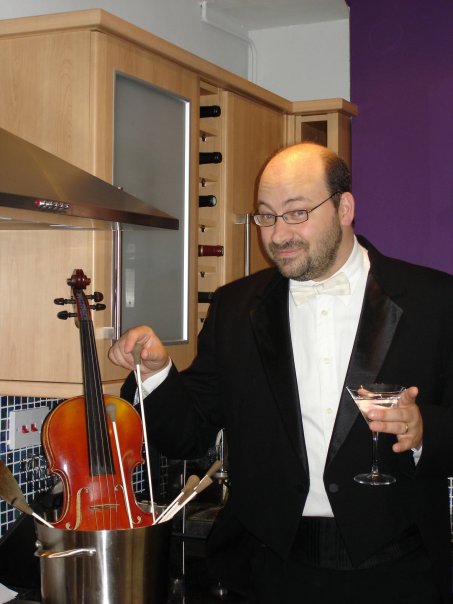This is a story which has gone un-told for too long.
Every time I conduct Beethoven’s 7th Symphony, I am reminded of the viola terrorist.
She was a very GREAT LADY, and the PRINCIPAL VIOLIST of the very slightly larger orchestra in the very slightly more populous town just up the road.
It would, of course, have been unrealistic to expect so eminent a person to join our Podunk orchestra, but, when we were really short-handed, she would, provided we made a suitable show of grovelling, “help out.”
“Helping out” was, most reasonably, contingent on our agreeing to a few ground rules. Wherever possible, she would not rehearse at all. She would, she assured us, be fine to simply show up at the concert to “help out.” This was, of course, perfectly sensible. After all, as she explained, she had “played it all before” and was “always completely prepared.”
If we absolutely needed her to “help out” the viola section in rehearsal, she would, reluctantly, do so for their benefit. In order to secure her services in the dress rehearsal (and only ever, at most, the dress rehearsal), we had to persuade her that the rest of the section were so pitiful, so woe-bedraggled and so hapless, that they literally could not pull themselves through a dress rehearsal without the heroic assistance of someone who had “played it all before” and was “always completely prepared.”
There were other stipulations – she wouldn’t sit in close proximity to certain colleagues and instruments, presumably to prevent injury or insult to either her aesthetic discernment or her “fine ear for pitch”acquired in her many years as PRINCIPAL VIOLIST of the very slightly larger orchestra in the very slightly more populous town just up the road. She also would never commit to “helping out” until about 36 hours before the concert, presumably to keep our orchestra manager from getting too much sleep.
And she would not, under any circumstances, share a stand with anyone.
We were truly blessed, then, to be sufficiently well-resourced to be able to accommodate her conditions for “helping out.” I gather neither of the Philharmonics in Vienna or Berlin was up to the task, as, to the best of my knowledge, I’ve never seen her “helping out” with either orchestra. I pitied them. After all, how many musicians do you know who have literally “played it all before?” Just think how much music that must be!
The last time I saw her, we were doing Beethoven 7. We had dutifully kowtowed and grovelled, given up any and all hint of self-respect and dignity, and also slagged off the existing viola section (actually very good, just a little small) to the point that anyone hearing us describe the other violas would not only have concluded they could not possibly play a Beethoven symphony without assistance, but would have also determined they probably couldn’t dress or feed themselves, either. She would, as of the day before the gig at about 10:30 PM, “help out” in both the dress rehearsal and the concert.
One is always excited about doing a Beethoven symphony (at least I am). But this was a particularly rousing weekend for me. It was the first time I was to conduct a Beethoven symphony using my own set of orchestral parts. There were no music librarians in Ken-land back then – I couldn’t afford help. Instead, I lovingly and painstakingly had marked every single part myself. Not just bowings, but bow placement and articulations, and I also made countless little adjustments for wind and brass balance.
Having a properly prepared set of Beethoven parts which matched what I was trying to do musically for the first time in my life was a fantastic feeling. The rehearsals had gone so much better than in the past, and I could see just how much clarity all that time marking things had brought to the orchestra’s reading of the piece. It was also the first time I did a Beethoven symphony with that group from memory.
Well, the day came, and the GREAT LADY arrived. We made sure she had a chair of the correct height (another non-negotiable) and that she had her OWN music stand, one that “didn’t wobble.” God help us all if she ended up with a wobbly stand. And we took great care not to let any of the wrong people sit too near her.
The dress rehearsal seemed to fly by in an instant. There was so much music to cover that week! The GREAT LADY had definitely brought her A-game. She was so well-prepared that she didn’t have to worry too much about actually playing anything in the rehearsal. Instead, she spent most of the rehearsal leaning over the right shoulder of our principal violist to “check what you’re doing there.” I can’t think of any other performer ever checking anything quite so meticulously.
The concert actually went well. Our admittedly inconsistent horn player had the night of his career, and everyone else really rose to the occasion. And talk about giving everything! Damn, did they play their guts out.
The one serious disappointment in the performance had been the work of the GREAT LADY. By the end of the concert, I feared for her health and/or her sanity. If the rest of the orchestra played short, she played long. If the rest of the violas played in the lower half, she played at the tip. If the whole string section started on a down bow, she started on an up. How could this have happened, given all that time spent leaning over her colleague’s shoulder, checking everything?
It was a mystery, but the lesson of the evening for me was that, much as it is a once-in-a-lifetime privilege (I hope) to work with someone who really has “played it all before,” it seemed wrong to continue to ask her to “help out” now that our regular viola section were doing so much better at tying their own shoes and putting their violas on the correct side of their heads. That was the last I saw of her.
Well, the years went by, and those parts, which will be on everyone’s desks when I next do Beethoven 7 with the English Symphony Orchestra on the 31st of January, have since been used many, many more times. Eventually, the memory of that last encounter with the GREAT LADY faded. Thankfully, it has been a long, long, long time since I had to put up with a string player who refused to share a stand.
Until….
Beethoven 7 was actually premiered by a huge orchestra, but these days, it’s mostly played by chamber orchestras. In the first several years after that concert I always did it with two or three desks of violas. The years went by, changes were made, bowings were revised (or tampered with), articulations corrected. After about 8 years, the time came to do it with a much larger band, so I needed to get out the long-unused 5th desk part, which had not been opened since the GREAT LADY’s farewell concert.
As soon as I opened the part, the memories of that fateful evening came flooding back. Every backward-ass bowing she’d done. Every wrong articulation, every spill over into a silence. They all came back to me in an instant.
Why?
Because, suddenly, I understood everything.
I had underestimated her completely.
She was not just a GREAT LADY, she was…….. a GREAT TERRORIST.
For years, I had always, naively, assumed her performance that fateful night was the result of a not-uncommon mix of hubris, incompetence and alcohol.
But years later, looking at that long-dormant viola part, I finally understood that her farewell performance was the result of a sort of twisted, malevolent genius.
You see, when I opened that fifth stand viola part, there weren’t just a few things that needed to be updated to incorporate changes made over the last few years since its last use. When I opened the part, my jaw dropped with a mixture of admiration, loathing and horror.
You see, the GREAT LADY wasn’t lying when she said she was “ALWAYS prepared.” A performance like the last one she had given with us could not simply be improvised. It needed to be planned, to be…. constructed.
Somehow, while breathing in the ear of my poor principal violist throughout the whole dress rehearsal, she had changed pretty much every bowing in the piece. She’d put dashes over Beethoven’s staccatos, and staccato dots in the middle of his slurs. She’d changed pianos to forte’s and even penciled in her own ritardandi. Now I understood why she could never share a stand with anyone!
It was an act of musical terrorism as carefully planned, and ruthlessly executed, as any act of political terrorism you can think of. Nothing had been left to chance.
Why did she do it?
I’ve never been able to figure it out. Did she hate me? Did she hate Beethoven? Was she just trying to bring us illumination by showing us how they play Beethoven 7 the in very slightly larger orchestra in the very slightly more populous town just up the road, where she was the PRINCIPAL VIOLIST?
I’ll never know.
I got out a nice, big eraser, admitted defeat, poured a beer, and set about cleaning up the part.
Was it a true story or just satire? What country did these events take place in, if they took place at all? Buy my memoirs in 25 years and find out. For now, I hope you got a laugh out of this tale of woe and misadventure…



This cracked me up! Another interesting post that lets us into your world.
Lovely story, well told! I will definitely buy your autobiograpy, I’ll be 82 then…
And I thought it was only we brass players that hatched plots like that!